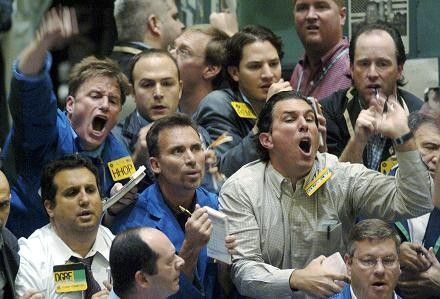U.S. Economy and Stock Market: Where Do We Go From Here?
Analysis

For U.S. investors, after the wildest week for the Dow Jones Industrial Average (DJIA) since the 1987 stock market crash, the concern is a valid one: you're concerned that your 401K is going to turn into a "201K."
It's prudent then -- it's certainly prudent for those investors who don't want to lose their shirt in this stock market -- to take a step back, breathe deeply, and read the analysis of two respected, veteran economists.
Submitted for your review: Economist Paul Krugman, columnist for The New York Times, and a Nobel Prize winner; and Marketwatch.com's Chief Economist Irwin Kellner, who in his 40 years as an economist has seen a recession or two, as well numerous bumpy stock markets.
Tea Party: It's Simply Wrong
First up: Krugman.
If you watch Fox News, you'd think that the United States' primary problem is the budget deficit.
However, U.S. stock and bond markets, as Krugman points out, are signaling what the real problem is: the U.S. unemployment rate, currently a horribly high 9.1 percent.
Conservatives and other deficit hawks have been warning for years that interest rates on U.S. Government debt are going to soar any time now - look out! Too much debt! Too much debt!
But, as Krugman notes, it hasn't happened. In fact, the reverse is occurring: interest rates are actually plunging to record lows -- and this is occurring despite Standard & Poor's (S&P) downgrade of the U.S. Government's credit rating. The yield on the benchmark 10-year U.S. Treasury note has fallen to 2.26 percent, and there's talk that it may drop to 1.75 percent.
A big deficit, a (controversial) credit downgrade, and the U.S. Government can borrow money for 10 years for 2.26 percent, and the bias is for still lower rates. Now, that's a sign of skyrocketing interest rates and runaway inflation, lol.
Krugman's point: the problem, short-term, is not the debt, or interest rates, or inflation. The problem is a lack of demand, i.e. a lack of jobs -- a condition made worse by the austerity measures imposed by the Tea Party, which won the U.S. debt deal debate.
Because the Tea Party hijacked the debt deal crisis and was able to force federal spending cuts, and cut the deficit without tax increases, the United States now faces the continued lost economic potential of $1 trillion per year -- the economic potential and earnings lost by all of the roughly 14 million unemployed Americans who want work but can not find it.
Krugman's solution: the U.S. economy really needs a short-term fix -- more fiscal stimulus.
Could Fear of Recession Help U.S. Avoid It?
MarketWatch.com's Irwin Kellner agrees with Krugman that the U.S. economic recovery has slowed, and the double-dip concern is real, but that concern may very well keep us out of it.
Kellner's take:
A number of commodity prices have fallen, which is lowering business' operating costs and the cost of living for consumers.
One key commodity price drop? Oil, which has plummeted from a recent high near $115 per barrel to about $85.
As a result, gasoline prices, which have declined about 10 cents in the past two weeks to an average U.S. regular unleaded price of $3.61 per gallon, should drop substantially in the next few weeks, increasing consumers' disposable income, just as the back-to-school shopping season starts -- to the benefit of retailers.
Lower oil prices will also help businesses at every level -- from manufacturers to transportation companies to electric utilities, Kellner said. Some investors don't know it, but oil is used in producing certain clothes, as well.
What's more, prices of other key commodities, such as copper, aluminum, cotton, wheat, corn, soybeans, oats and rye, have fallen, as well.
Further, those prices declines give the U.S. Federal Reserve more time to maintain monetary easing to stimulate the U.S. economy without a threat to price stability.
Add lower home mortgage rates (a tailwind for the beleaguered U.S. housing sector), a weaker dollar (which should boost exports), and an S&P downgrade that should encourage the political parties in Washington to cooperate, and the combination may very well be enough to keep the U.S. economy from tipping into a double-dip recession.
Economic/Market Analysis: Krugman argues that the U.S. economy needs more stimulus; Kellner, that the commercial sector, aided by commodity price declines, among other factors, may have enough oomph in the system to avoid a double-dip recession.
The view from here argues the U.S. economy could use another dose of fiscal stimulus, but with the Tea Party in charge of the House Republican Party, no such stimulus in coming. The Tea Party has done what's right for the Tea Party constituency, but it has hurt the nation, and the U.S. economy in the process: its actions will lead to continue sluggish economic growth.
Combine that continued sluggish U.S. GDP growth with renewed concerns about European government debt, and the outlook for stocks for the next two quarters is not good: volatility is likely to continue, at least until institutional investors know the extent of the latest government debt concerns in Europe (Italy, Spain, Portugal, and now France's banks and possibly France itself).
The above suggests a U.S. stock market where the bears have the upper hand throgh at least early December 2011 and a Dow decline to 10,000 or 9,000 is likely. If Dow 9,000 gives way, the hope is that the Dow will find support at/near 7,700 to 7,800.
© Copyright IBTimes 2024. All rights reserved.





















